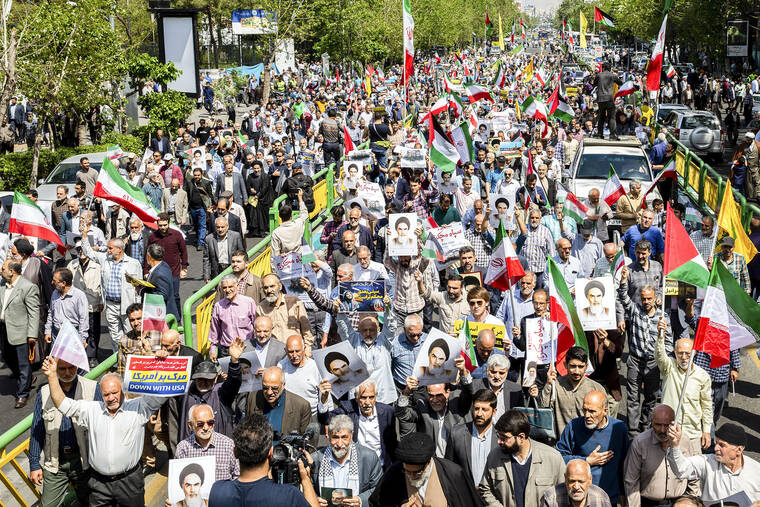Israel strikes an Iranian military base, but damage appears limited
The Israeli military struck Iran early Friday in retaliation for an aerial attack on Israel last weekend, according to two Israeli and three Iranian officials, but the strike appeared to be limited in scope and the reaction from both Israel and Iran was muted.
Iranian officials said that the strike had hit a military air base near the city of Isfahan, in central Iran, and that it had been carried out by small drones. They said the drones might have been launched from inside Iran, whose radar systems had not detected unidentified aircraft entering Iranian airspace.
ADVERTISING
If the drones were launched within the country, it would demonstrate once again Israel’s ability to mount clandestine operations in Iranian territory. Iranian officials said that a separate group of small drones was shot down in the region of Tabriz, roughly 500 miles north of Isfahan.
Israeli warplanes also fired missiles during the retaliatory strike, a Western official and two Iranian officials said. It was not immediately clear whether Iran’s defenses intercepted the missiles or where they landed.
The Israeli military declined to comment. A senior U.S. official said Israel had notified the United States through multiple channels shortly before the attack. All the officials spoke on the condition of anonymity because they were not authorized to discuss the matter publicly.
Addressing reporters at a meeting of foreign ministers from the Group of 7 in Italy, U.S. Secretary of State Antony Blinken said the United States had “not been involved in any offensive operations” in Iran. But he declined to comment further and would not confirm the Israeli strike, referring instead to “reported events.”
In public, Iranian officials played down the attack.
Maj. Gen. Abdolrahim Mousavi, commander in chief of Iran’s army, said that explosions heard early Friday in Isfahan “were from our air defense firing at a suspicious object” and that there had been “no damage.” An Iranian lawmaker, Seyed Nezamedin Mousavi, called the strike “ridiculous” and said it showed that Israel had “accepted defeat and is content with these ineffective actions.”
World leaders, who had been urging Israel and Iran to de-escalate tensions, once again implored both countries to avoid any taking any further action that could set off a wider war in the Middle East while Israel is fighting Hamas in the Gaza Strip and Hezbollah in Lebanon, both allies of Iran.
“Significant escalation is not in anyone’s interests,” British Prime Minister Rishi Sunak, whose military participated in defending Israel against Iran’s missile-and-drone attack last weekend, told reporters Friday. “What we want to see is calm heads prevail across the region.”
Some analysts said the small scale of Israel’s attack could give both Iran and Israel a reason to refrain from further military strikes.
“It appears we are out of the danger zone and, because Israel’s strike was limited, it has allowed both countries to back down for now,” said Sanam Vakil, director of the Middle East and North Africa program at Chatham House, a British research institution.
The area around Isfahan has several Iranian military sites, including nuclear facilities that Israel has targeted in the past. But Iranian news agencies reported that none of the nuclear facilities had been hit and appeared keen to show that life was “back to normal” in the city known for its turquoise and purple tiled mosques, picturesque arched bridges and Grand Bazaar. Iran’s official news agency, IRNA, published a gallery of photos of people out and about in Isfahan — among them, women strolling with shopping bags and a child kicking a soccer ball.
Iranian President Ebrahim Raisi had forewarned that “the tiniest act of aggression” on his country’s soil would draw a response. But as of Friday evening in Iran, there had been no public calls for retribution by Iranian officials. Iran’s former foreign minister, Javad Zarif, described the strike on Isfahan as “reckless fireworks” and urged world leaders to “focus on ending Israeli transgressions, particularly its war on Gaza.”
SANA, a Syrian state news agency, reported that Israeli missiles also hit a Syrian air defense site in southern Syria at 2:55 a.m. on Friday, causing some damage but no casualties. It was not immediately clear whether the strike was part of the Israeli response to Iran’s attack last weekend. The report gave no further details, and there was no immediate comment from Israel.
The Syrian Observatory for Human Rights, a Britain-based monitoring group, said the strike in Syria had targeted a radar system in the southern province of Dara’a. It said that the Syrian military had detected Israeli aircraft entering the country’s airspace but that its air defenses did not try to intercept the strikes. Iran-backed armed groups throughout Syria had been on high alert, anticipating a possible Israeli strike, the group said.
Speaking on the last day of the G-7 meeting on the Italian island of Capri, Blinken declined to say whether the United States had been notified in advance of the Israeli strike. Shortly before he spoke, Italy’s foreign minister, Antonio Tajani, told reporters that the United States had been informed ahead of time.
“But there was no involvement on the part of the United States,” Tajani said. “It was simply information which was provided,” adding that he believed that the group’s collective efforts deserved credit for “the small scale of the event.”
Israel struck Iran in response to more than 300 missiles and drones that Iran fired at Israel last Saturday night, nearly all of which were shot down. Iran said that attack was carried out in retaliation for an April 1 strike on an Iranian diplomatic compound in Syria that killed seven Iranian military officers.



